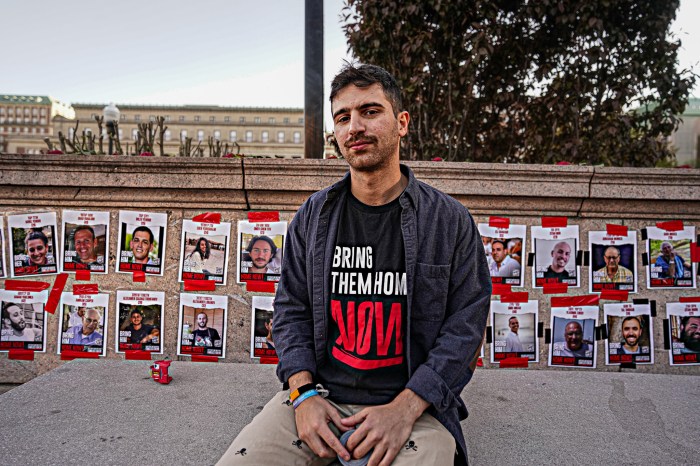The 2015 Philadelphia Film Festival reaches its end, with plenty of name titles yet to hit, plus some carry-overs you should catch if you missed them last weekend. Visit the site for the schedule and tickets. ‘The Benefactor’ RELATED: “Our Brand is Crisis” is a political satire more goofy than heavy-handed ‘The Birth of Sake’ ‘Disorder’ ‘Funny Bunny’ ‘Hot Sugar’s Cold World’ ‘In Transit’ ‘Krisha’ ‘Love’ ‘Mia Madre’ ‘Mountains May Depart’ RELATED: “Burnt,” with Bradley Cooper as Bourdain (again), is basic, and that’s fine ‘My Golden Days’ ‘(T)error’ ‘The Treasure’ ‘Viaje’ ‘Where to Invade Next’ The Philadelphia Film Festival runs through Nov. 1. Full the full lineup, schedule and tickets, visit their site. Follow Matt Prigge on Twitter @mattprigge and Gary M. Kramer at @garymkramer
3 Globes
Set and shot in Philadelphia — the city sparkles — “The Benefactor” is an obvious redemption tale about Franny Watts (Richard Gere), a philanthropist with more money than sense. His pet project is Olivia (Dakota Fanning, underused), the pregnant daughter of his late best friends, and her husband Luke (Theo James). Franny overcompensates for his guilt by giving Luke a job, and the couple a house before his deep, dark secrets come to light. In a juicy role, Gere is charming and cringe-inducing, and his mercurial performance is compelling even when “The Benefactor” is at its most ludicrous and melodramatic. (Gary M. Kramer)
3 Globes
Heavy on mood but hardly short on intel, this look at a 140-year-old Japanese brewery is a hushed and contemplative affair, over half of which is hypnotic stares at rice being raked and liquid being heated. (It’s shot in the rectangular-shaped cinemascope — a rare stylistic move for a doc.) It’s as gentle as the workers, but equally mournful. Their job is monastic, forcing them to spend half the year away from their families and holed up, much like shipworkers off on a long stint. That they’re practicing a dying art doesn’t help either; the number of breweries has dropped over the last century by over a fourth, and they worry that they may be dedicating their lives to a tradition that’s on the way out completely. (Matt Prigge)
4 Globes
In this slow-burn French import, Vincent (Matthias Schoenaerts) is a beefy soldier with PTSD. Taking a personal security job for Whalid (Percy Kemp), he is asked to “babysit” Whalid’s wife Jessie (Diane Kruger) and their son Ali (Zaid Errougui-Demonsant) for 48 hours. Vincent takes his work seriously — possibly too seriously — as he eavesdrops, observes, and perceives threats. Director/co-writer Alice Winocour shrewdly uses sound, silence, and video to immerse viewers in Vincent’s mindset, and she ratchets up the tension as he dutifully protects his clients from chaos. As a character study, “Disorder” may be a bit thin, but Schoenaerts is superb. (GMK)
3 Globes
A locally shot, low-budget character study, director Alison Bagnall’s dramatic (not comic) “Funny Bunny” charts the unlikely friendship between Gene (Kentucker Audley), a lonely, divorced man, and Titty (Olly Alexander), a wealthy, lonely teen who has an obsession with breasts. The pair head off to meet Ginger (Joslyn Jenson), whom Titty knows from online. She initially rejects them, but then involves them in animal activism, whereby all three characters discover their true selves. The performances are strong — Alexander, especially — but Funny Bunny unfolds too slowly. As the characters struggle and grow, the film will either move viewers or simply irritate them. (GMK)
3 Globes
Hot Sugar (Nick Koenig) records sounds: sidewalks being shoveled, an expensive piano being played, and the silence of a room containing a corpse. This intriguing documentary chronicles his efforts to make music from these sounds — and make sense of the world. It is fascinating to see Hot Sugar build a song from the sounds he captures, and there are other captivating moments, from an encounter with an intense fireworks salesman to an interview with Neil deGrasse Tyson. However, “Hot Sugar’s Cold World” is tonally uneven; it may be best enjoyed by viewers who let the sounds and images wash over them. (GMK)
5 Globes
This magnificent, observational documentary records snippets in the lives of various passengers on Amtrak’s Empire Builder, which travels back and forth between Chicago and Seattle. From single mothers to North Dakota oilmen, viewers eavesdrop on the lives of a cross-section of strangers who tell heartfelt — and at times heartbreaking —stories about being at a crossroads in life. The interviewees share their personal philosophies and talk about finding themselves on their journey. “In Transit” is a remarkable portrait of eloquent, everyday people, and the last film directed by Albert Maysles (co-directing with Lynn Ture, Nelson Walker, Ben Wu and David Usui). Not to be missed. (GMK)
4 Globes
A SXSW hit that transcends being arguably too personal, Trey Edwards Shults’ feature debut stars his aunt, Krisha Fairchild, as an aging freespirit named Krisha who shows up at a family reunion filled with other real-life family members. Shults likes to bang out his shots in mobile long takes that isolate Krisha in group settings, making visceral her inability to connect, even when going head-to-head with the concerned or disillusioned. The tone, vaguely comedic, always on-edge, helps temper what may boil down to group therapy, even when Krisha loses control over the urges that got her into trouble in the first place. (Fairchild, it should be noted, is not playing herself but a composite of other family members.) If only more TMI family airings had this one’s formal chops or as winning a lead performer. (MP)
4 Globe
Gaspar Noe’s 3-D art-porn features lots of actual porking, plus two cases where our strapping male lead puts out the camera lens. But as with “Irreversible” and “Enter the Void,” there’s a method to the shocks. Getting in deep with a disarmingly dumb dude (Karl Glusman) as he broods over a possibly dead ex (Aomi Muyock), it shuffles around memories of a relationship largely defined by some pretty hot bonking. As ever, Noe overly spells out his ideas, even making his hero a film student talking up a film exactly like the one he’s in, though even all the bolding and italicizing and underlining of the ideas can’t get in the way of the long, languorous stews in fond recollections, which just happen to include, say, an opening five minutes of full-on servicing. (MP)
3 Globes
A return to form for Italy’s Nanni Moretti after the bizarrely wan “We Have a Pope,” this dramedy is two films: one following its lead (Margherita Buy) as she struggles to direct a serious labor strike saga with an uncooperative American lead (a wigged-out John Turturro), the other showing her dealing with the imminent death of her mother (Giulia Lazzarini). As ever Moretti is deadpan and wise, rattling off sharp observations, especially about how we treat the dying like children, afraid to cope with the oblivion of loss. It’s the insights that hold this sometimes rickety contraption together. (MP)
3 Globes
The most mainstream film China’s hyper-critical Jia Zhang-ke has ever made isn’t, thankfully, that mainstream. Like “A Touch of Sin,” it’s a group of episodes, these ones following the same characters from 1998 through 2014 way into 2025. Jia regular and real-life wife Zhao Tao plays a naive youth embittered by a bad marriage and loss, while Jia busies himself charting the Westernization of his nation. The second segment is the most emotionally direct this detached filmmaker — who’s historically made doc hybrids like “Still Life” and “24 City” — has ever been, so moving that it makes up for the slightly scattershot dip into the future. (MP)
4 Globes
French filmmaker Arnaud Desplechin’s films are reliably overstuffed with pure stuff, often brimming over the pot. “My Golden Days” is not only one of his busy looks at the love lives of the over-stimulated, like “Kings and Queen” and “A Christmas Tale.” It’s a prequel, of sorts, to his 1996 great “My Sex Life…or How I Got into an Argument,” catching back up with grouchy Paul Dedalus (Mathieu Amalric, Desplechin’s own Robert De Niro) as he reflects back on his youth, when he’s played by the charismatic Quentin Dolmaire. Chief among his obsessions is his on-off relations with Esther, once played by Emmanuelle Devos, now portrayed by Lou Roy-Lecollinet, whom he pursues right before he’s whisked away to school. That Roy-Lecollinet looks little like Devos (she’s blond, for one) is a sign that Desplechin doesn’t mean this as a strict brother film to “My Sex Life.” It’s free to do whatever it wants — to bottle up a story of young romance that’s definitely familiar but also infused with the filmmaker’s exceedingly unique voice. It teems with details, with grumpiness, with romanticism and with ever-darting camerawork, all in service of capturing if not Desplechin’s own golden days then that feeling where every sensation feels new and decidedly extreme. (MP)
4 Globes
A devastating real-life dark comedy spliced with a despairing study of loneliness, this doc hangs with Saeed Torres, a former Black Panther who spent post-9/11 as a covert informant for the feds, spying on the Muslim community and turning in dodgy reports. The film spends years with him as every encounter is predicated on lies, and every move is questionable, all while we get a glimpse of how bureaucratic disorganization leads to unnecessarily ruined lives. But it’s Torres’ sadness that sticks out the most — a man who let himself be cut off from any form of meaningful human interaction. (MP)
5 Globes
Corneliu Porumboiu’s “The Treasure” is a buried treasure movie, but it’s also a Romanian New Wave movie. Films of its ilk — “The Death of Mr. Lazarescu,” “Four Months, Three Weeks, Two Days,” Porumboiu’s own “Police, Adjective” — err toward the grim and hopeless, capturing a society tied up in Kafkaesque bureaucracy and endless knots of red tape. As such, this simple adventure gets hilariously dragged down to a particularly miserable place on earth. And yet, watch enough Romanian cinema and you think you know the grim place this is going to end. But you’re wrong — hysterically, memorably wrong. (MP)
4 Globes
Writer/director Paz Fábrega’s fabulous, minimalist romance, “Viaje,” has Luciana (Kattia Gonzalez) and Pedro (Fernando Bolanos) meeting cute at a costume party. The couple kiss, chat playfully, and spend the night together. The next morning, however, Pedro must head out to Rincón de la Viaje National Park for fieldwork. Luciana impulsively agrees to join him for camping (in the rain), tree climbing, skinny-dipping and sex. The attractive performers have undeniable chemistry as they navigate their sudden relationship. This sweet Costa Rican film, shot in luminous black and white, is as charming, sexy and funny as its two leads. (GMK)
3 Globes
Michael Moore’s latest is, as always, over-simplified and sometimes flat-out wrong. But it’s also his lightest and most hopeful, closer to his pre-ubiquity “TV Nation” days, when he’d poke at specific plaints rather than try to take down biggies like gun control or a sitting president. Here, he settles for globe-trotting, picking out social services done better in other nations (mostly in Europe): generous vacation time in Italy; extravagant school lunches in France; Norwegian prisons that actually (maybe) reform inmates. You can pick any of these apart (and some already have), but he’s open about aiming for a utopia where government does well and even aids in citizens’ happiness. (MP)




























